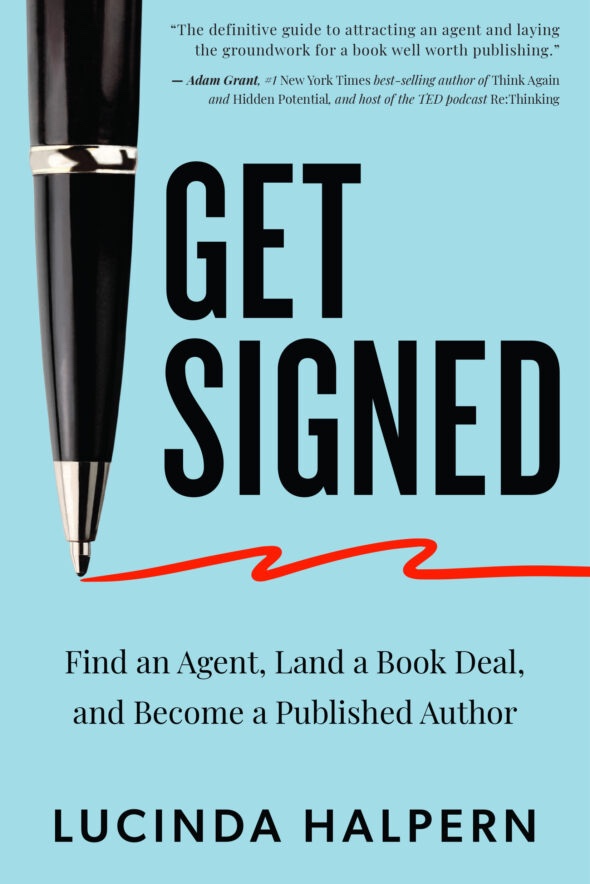Search
Lucinda’s Tips for Mastering Your Query Letter
Lucinda Halpern shared her latest publishing insights from this month. Read on to see her latest news, and if you’d like to receive her monthly newsletter directly in your inbox, sign up here.
# # #
You can be an author no matter how your book enters the world—whether you self-publish, work with a hybrid publisher, or get a book deal through the traditional route.
When it comes to this last avenue, it’s helpful to remember that traditional publishing is a business first. And you have to know the rules of that business to succeed. One of the first things you’ll need to master? Your query letter. This is the submission letter you make to a literary agent or agency which provides them a pitch about your work for their consideration to represent.
When you send a query letter to an agent, you can be sure of one thing: it will land in an overflowing inbox alongside a deluge of other queries. So yours has to be compelling enough to stand out… First, so it doesn’t get overlooked, and second, so it can achieve its primary goal: getting the agent to request more material. (I even dedicate a whole chapter to “pitching persuasively” in my book Get Signed, where you can find winning query letter examples, including those from first-time authors represented by Lucinda Literary, like Tracy McCubbin and Michael Solomon).
In your query letter, your job is to convince an agent (and later, readers) of these three things:
- Why your book is desirable and desired right now;
- What’s different about your approach or point-of-view;
- The promise your book offers, whether that’s something your readers will gain, your characters will experience, or both.
If you’ve been thinking about publishing a book for a long time, then you’ve probably received lots of different querying advice from tons of different great sources. But what if I told you that the best thing you can do in order to perfect your query letter is to forget everything you’ve ever heard?
Whether you are a seasoned querier or entirely new to the process, in this market, I’d like to bust a number of common querying myths out there that you have likely come across in your research:
Agents don’t care who you are, so you shouldn’t include any information about yourself in your letter.
This is entirely untrue! Whether it’s your bylines, your e-mail list, the author friends who will endorse your work, or an immediate grasp of your voice, we want a sense of the person behind the page (that’s you!) and why readers will trust you as their guide through whatever territory they’re exploring.
A long and detailed synopsis should be the focus of your letter.
While other agencies may wish for this, I advise authors to instead study Amazon descriptions of comparable titles to emulate capturing your book’s greatest intrigue—not the traditional, formal synopses you learned in school! A stellar query letter is far more like writing jacket copy, emphasizing what a reader will take away from your book.
You have to guess your genre right the first time around.
No writer, even the most seasoned, is 100% certain about how their book will be categorized, or what comparative titles an agent or publisher will envision for it. With that said, you can’t afford to leave your genre or comps left unsaid in your letter. So to better categorize where your book best fits on market shelves, tailor your comps and genre to meet the agency’s interests. This tactic demonstrates that you’ve done your research, not only on your genre but on the agency, too.
Never contact an agent directly unless their submissions page says so.
There are so many ways to take a “side door” versus the more typical “front door” approach listed on free agency search sites. Using an actual industry database like Publishers Marketplace is a more effective route to ensure your query actually lands in an agent’s inbox and gets a look. I LOVE strategizing with writers about effective query approaches in our courses and consultations.
Don’t follow up. An agent will always reach out to you if interested.
One can hope! But hope isn’t a strategy. Agents may only see your query the second time. Experiment with new subject lines, or an update if your proposal or manuscript is under review with other agents, or you have recently published an article in a notable publication, amassed a larger social media following, obtained the endorsement of a fellow author. There are so many ways to be creative. Don’t have any of this to share? For an agent you admire, write a simple love letter. Confirm your query landed in the first place.
Reach out to every agent possible at once.
There are several risks to this, and one is that a “slush” approach is unlikely to appear as anything but slush. Agents are flattered—and can tell—when they’re part of a small and curated list and are receiving a more personal letter. So take the time to tailor messages to those top 10-15 agents in your list.
You only get one shot.
Is a door really ever closed? Maybe you’re asking the wrong person! Whether submitting a revision of your material or something new all together, plenty of writers—including several I’ve signed—find success the second time around.
With this new perspective on querying effectively, I’d also like to inform you of two basic rules to querying that you can use to outline a first draft of your letter:
1. Start with the hook
The opening lines of your query are crucial—for fiction or nonfiction. What’s most revelatory about your book in a nutshell? In an agent’s inbox, there are myriad reasons for why they could decide not to request your proposal. Don’t allow for this possibility.
What’s most compelling and unique about your book? Do you solve an age-old problem? Turn a long-held myth on its head? Will you reveal cutting edge science that will change the way we see the world? For fiction queries, what’s the premise of your story and what makes it timely? What is it about your novel that will have readers turning the pages?
2. Then dive deeper, share details of the book
Once you’ve piqued the reader’s curiosity, it’s the moment to dive deeper. Tell us why your book matters and why it matters now. For nonfiction writers, delve into the key specifics of the problem you’re solving and why it’s important. And then, of course, deliver a detailed look at your solution and how it differs from the many other websites and books that exist on your topic. Here you should also address why you are the person to write this book. What are your credentials? Why should a reader trust you?
I’d love to see some strong queries come from you through our agency’s portal!
And if you want more insights on how to write the perfect query letter, be sure to look into our on-demand query letter writing course.








